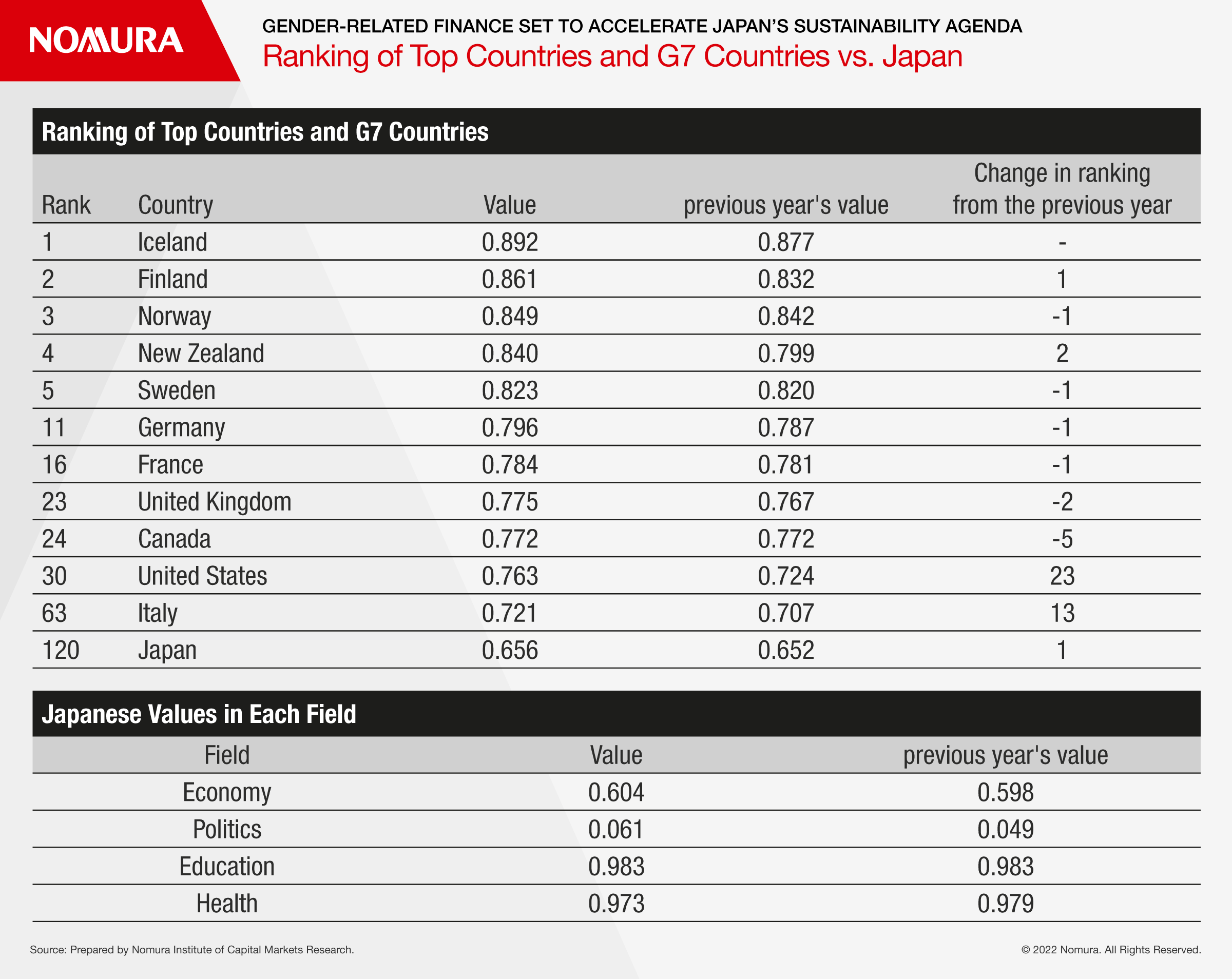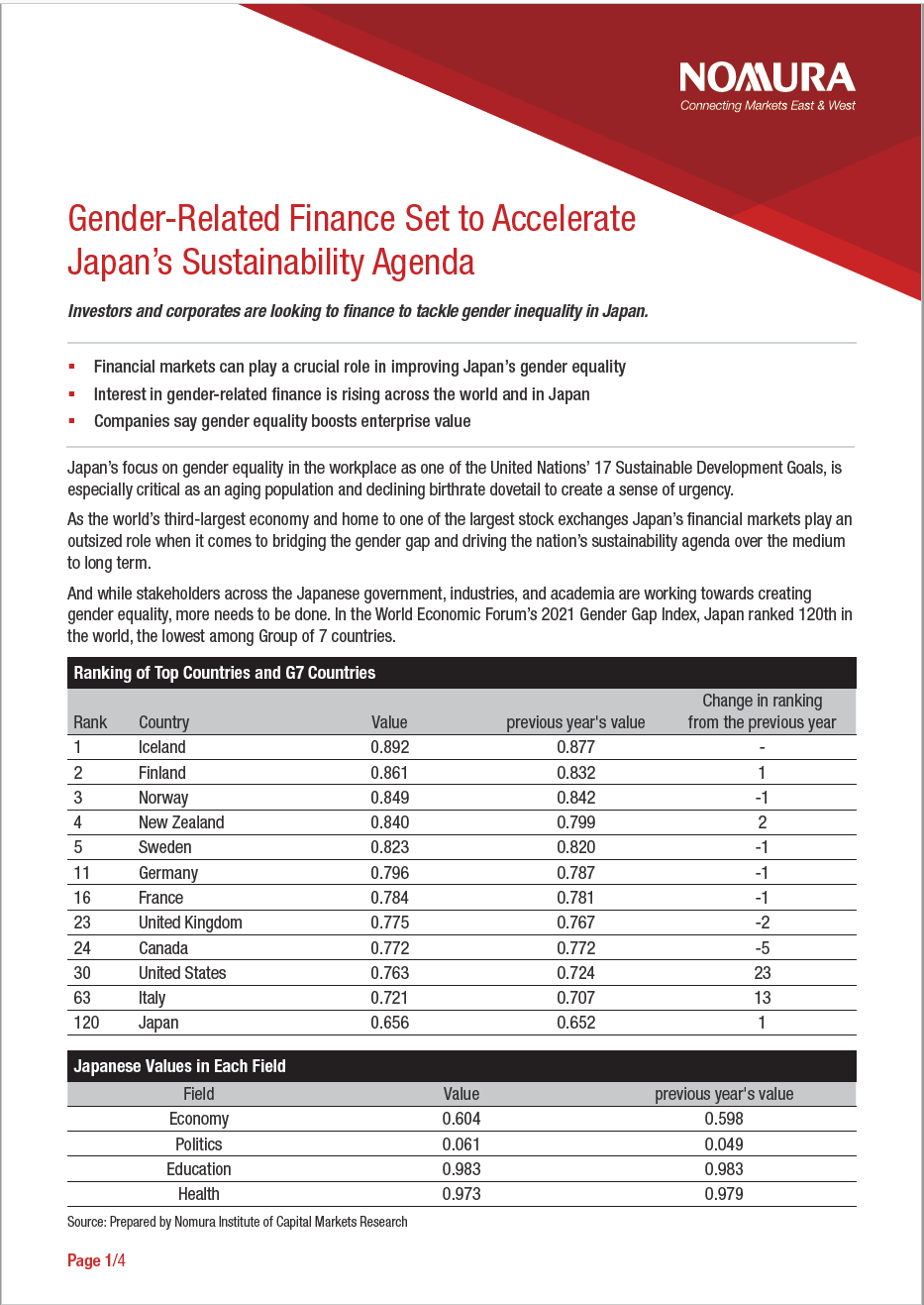
Gender-Related Finance Set to Accelerate Japan’s Sustainability Agenda
Investors and corporates are looking to finance to tackle gender inequality in Japan.
- Financial markets can play a crucial role in improving Japan’s gender equality
- Interest in gender-related finance is rising across the world and in Japan
- Companies say gender equality boosts enterprise value
Japan’s focus on gender equality in the workplace as one of the United Nations’ 17 Sustainable Development Goals, is especially critical as an ageing population and declining birthrate dovetail to create a sense of urgency.
As the world’s third-largest economy and home to one of the largest stock exchanges Japan’s financial markets play an outsized role when it comes to bridging the gender gap and driving the nation’s sustainability agenda over the medium to long term.
And while stakeholders across the Japanese government, industries, and academia are working towards creating gender equality, more needs to be done. In the World Economic Forum’s 2021 Gender Gap Index, Japan ranked 120th in the world, the lowest among Group of 7 countries.
For Japan to achieve a more sustainable economy and society, gender equality efforts must pick up pace, and the capital markets might provide the answer.

The rise of gender-related finance
Gender-related finance or gender-smart investing involves adopting an investment strategy that addresses the gap between women and men by deliberately and measurably leveraging capital to advance gender related causes.
Several global initiatives over the last decade have spurred the growth of gender-related finance. Among the most prominent are the United Nations’ Principles for the Empowerment of Women, and the 30% Club, a campaign to boost female representation at the board and C-suite level in the world’s biggest companies across more than 20 countries, including Japan.
On an encouraging note, the steady growth in gender-related investment since the start of 2020 is widely acknowledged to have increased focus on solving social issues, including gender inequality, during the pandemic.
What’s in it for investors and corporates?
The objectives of gender-related investment can include the following:
- Improving women’s leadership
- Boosting women’s access to capital
- Ensuring gender equality and women’s wellbeing in the workplace
- Supporting the development of products and services that benefit women
- Addressing pressing gender justice and equality issues
- Increasing the number of women investors
- Enhancing knowledge and trust among female market participants
In a broad sense, investors want to achieve these goals to have a positive impact on the economy and corporate performance. Global gender inequality is estimated to cause about $160.2 trillion of loss to wealth per year. On the other hand, efforts to achieve gender equality could boost global gross domestic product by $13 trillion in 2030, according to McKinsey & Company.
From a corporate performance perspective, empirical analysis conducted by McKinsey shows the top 25% of companies with advanced gender equality on the executive management level will have a 25% higher probability of financial performance than the average of countries and industries where equality is in question.
Several companies are now publishing their own analyses demonstrating how gender equality contributes to enterprise value. Various academic research shows that companies with gender diverse boards tend to be tend to be less prone to securities fraud, adopt more proactive and comprehensive corporate social responsibility strategies, have a positive correlation with greater renewable energy consumption and actively promote climate change governance and innovation.
For instance, Japanese pharmaceutical giant Eisai analyzed the correlation between ESG initiatives, and the price-to-book value ratio (PBR) based on its own data, and found that a 10% improvement in the ratio of female managers resulted in a 2.4% increase in PBR after seven years.
Tools for gender-related investment
To make this a more accessible market, since 2010, financial institutions around the world have deployed several instruments to adopt gender-related financial practices.
The range of public market instruments based on gender is expanding to include mutual funds, exchange-traded funds, certificates of deposit, gender bonds and separately managed accounts.
In Japan, popular gender-related financial products include the NEXT FUNDS MSCI Japan Empowering Women Select Index Exchange Traded Fund, and gender bonds issued by the Japan International Cooperation Agency in September 2021.
When considering the investment balance of gender-related stock funds, there appear to be more investments in the finance and information technology sectors, and they are skewed more towards developed countries.
To be sure, gender-related investment into private markets is also increasingly popular, reaching about $6 billion at the end of June 2021, according to Project Sage by Wharton Social Impact Initiative. Venture capital, private equity, and debt accounted for the majority of the investment tools used in this market, while on a sector basis, healthcare, agriculture, and fintech were most popular. The United States and Canada accounted for the largest share of investment by country.
The Japan Impact Investment Fund No.1, which covers companies engaged in businesses related to childcare, school-age children, support for women’s empowerment, and work-life balance, is an example of a popular private market gender investment vehicle in Japan.
With all these instruments at investors’ disposal, gender-related finance is expected to play an increasingly central role in building a more sustainable economy and society in Japan. However, it is important to note that sustainable finance is based on the concept that social, economic, and environmental aspects of development must be integrated and not viewed as independent of each other, which means that ongoing efforts to combat climate change and correct broader inequality cannot take a backseat.
Download a PDF of the full whitepaper
Contributor

Akane Enatsu
Head of Nomura Research Center of Sustainability, NICMR

Takamasa Ueda
Nomura Wealth Management (formerly NICMR)
Disclaimer
This content has been prepared by Nomura solely for information purposes, and is not an offer to buy or sell or provide (as the case may be) or a solicitation of an offer to buy or sell or enter into any agreement with respect to any security, product, service (including but not limited to investment advisory services) or investment. The opinions expressed in the content do not constitute investment advice and independent advice should be sought where appropriate.The content contains general information only and does not take into account the individual objectives, financial situation or needs of a person. All information, opinions and estimates expressed in the content are current as of the date of publication, are subject to change without notice, and may become outdated over time. To the extent that any materials or investment services on or referred to in the content are construed to be regulated activities under the local laws of any jurisdiction and are made available to persons resident in such jurisdiction, they shall only be made available through appropriately licenced Nomura entities in that jurisdiction or otherwise through Nomura entities that are exempt from applicable licensing and regulatory requirements in that jurisdiction. For more information please go to https://www.nomuraholdings.com/policy/terms.html.




